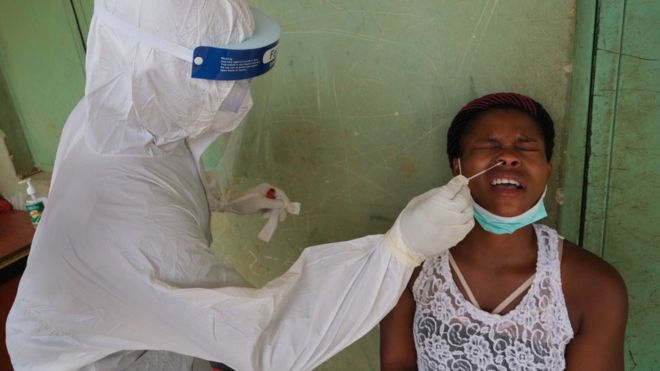The year 2020 started in Ghana as normally like any other.
Apart from entering it with the full knowledge that it wouldn’t be long before we were dragged into the divisive brand of politics that we are usually served in election years as the major political parties jostle for favour before the electorate, nothing seemed out of the ordinary.
A few weeks before the new year was ushered in, we had heard from international news sources about the outbreak of a strange new disease, called Coronavirus or COVID-19, as it later came to be known, in China that was posing a challenge to the health care system in that country.
As China raced to bring the disease under control, it soon spread to other countries in Europe, with Italy, Spain and the United Kingdom, being the hardest hit. The United States of America soon felt the full force of what has now become a full-blown pandemic.
It was soon the turn of Africa to record its own cases of the disease albeit at lower rates than elsewhere.
Here in Ghana, news of COVID-19, while generating some curiosity among citizens, didn’t cause too much anxiety as it was initially deemed no different from previous outbreaks like SARS which never really got to our shores. We had something of a scare with Ebola in 2014 which broke out in some neighboring countries but thankfully never got here.
All that changed on the night of 12th March, 2020 when at a hurriedly arranged press conference, the Health Minister, Kweku Agyeman Manu, announced the first two cases of COVID 19 in Ghana. Our lives have not been the same since that fateful night and it has been disrupted in ways that we could not have imagined barely a month ago.
The previous night, President Nana Akufo-Addo had in a broadcast to the nation announced a series of measures aimed at protecting Ghanaians against the disease. Those measures now pale into insignificance when compared with what was to follow.
Since then, our borders have been closed, we have endured three weeks of a partial lockdown in three regions, there have been bans on all forms of public gatherings which have led schools and other organizations to be closed and strict social distancing rules have been introduced.
We have also been bombarded with public education campaigns in the media on how to beat the disease.
It would have been unthinkable just a few months ago, that the divisions of politics in our country, would give way to a common effort by all Ghanaians to overcome a single, invisible enemy, especially in an election year where political activity was to be the dominant theme.
It has been admirable how political and social differences have been buried and all efforts channeled into addressing the challenge posed by this pandemic.
For a start, President Akufo-Addo has led from the front in this battle, implementing a raft of tough but necessary measures to secure the country. He has rolled out wave after wave of social and economic policies to lessen the inevitably adverse impact of the measures he has been compelled to take in the larger interest of the country.
Drawing on a combination of domestic and external sources, he has mobilized resources to underwrite the huge financial cost of absorbing electricity and water bills, providing hot meals for 400,000 households as well a GHS 600 million interest-free loan package for small and medium enterprises which have borne the brunt of the forced cessation of economic activity.
His almost weekly broadcast or updates, as they are dubbed, usually delivered late at night, have inspired and rallied all of us to this common and highly important national cause. This has been complemented by regular briefings from the Ministry of Information to let Ghanaians know where things are.
The opposition, especially the NDC, have also done their bit to keep us afloat as a nation. Led by Former President John Mahama, they first formed a COVID-19 response team made up of respected health and disaster specialists who have spoken with deep knowledge and insight about the pandemic.
Mr. Mahama has made various donations running into hundreds of thousands of Ghana cedis ranging from much-needed PPEs and medical supplies to food items for 20,000 households.
He has particularly earned plaudits for the forward-looking investments he made in health and other sectors while in office and which have become vital to the current fight against the deadly COVID-19.
All Members of Parliament and Parliamentary candidates on both sides of the political divide have literally turned Ghana into one big philanthropic arena with donations of hygiene and food products to constituents across the country, even if it is irksome to find pictures of politicians and other party symbols on some of the donated items.
As of the time of writing this piece,1042 cases of COVID-19 had been recorded with 99 recoveries and 9 deaths. Pitched against the situation in even advanced countries, we could be said to be doing relatively well but this must not lull us into a false sense of security and progress.
As the Akan saying goes, the ailment that left the vulture bald would most likely leave the hawk dead. The magnitude of the outbreaks in those countries would have completely overwhelmed us and totally brought us to our knees as a country.
We simply do not have the systems to deal with what some advanced countries are struggling with at the moment. Rather than thump our chests at our modest efforts, we must utilize this period and its immediate aftermath to carry out sober reflection and deep introspection about the state of our country.
This pandemic appears to have brought out the best in us as a people and it has shown that it is possible to unite around a common cause and address our problems and if this model were to be adopted and applied in tackling the hydra-headed problems that we face, perhaps more progress can be made.
That notwithstanding, the disease has also exposed gaping holes in our already fragile health and social welfare systems. It has really brought to the fore the inequalities in our country and our inability to provide the appropriate safety nets for the most vulnerable sections of society.
There are many languishing in desperate circumstances currently, not who do not know how they are going to survive if this disease lingers any longer.
There are already signs of very difficult days ahead as Ghana’s economy is set to grow at 1.5% this year instead of the budget figure of 7.5%.The resources that have been channeled into all the measures adopted so far were originally not meant for that purpose. That means there will be little left going forward to cater to the needs of the people.
With government revenue set to drop significantly because of diminished activity in key sectors of the economy, we can assume the worse. We will pull through as a country, but can we survive a similar situation in the future with the present state of our country?
Even as we compare our own efforts with those of developed countries, we must not forget that there are other smaller countries, some of whom we started the journey of nationhood with, such as South Korea, which have done better in this fight. Not only have they better managed the pandemic, they have demonstrated a return to normalcy by actually holding elections only last week.
I would rather we strove to be like those countries instead of taking solace in the woes of powerful countries who despite having the means to either avert or quickly deal with an outbreak like this, slept on their laurels and complacently failed to take the necessary steps to hold themselves in readiness. That this is a novel virus is no excuse for failing to build a system that can stand the test of time.
While all attention is focused on COVID-19, Cerebrospinal Meningitis has claimed the lives of about forty of our compatriots. This is a disease that is well known and whose outbreak is often anticipated.
How after many years of similar outbreaks we continue to struggle with it is a great mystery. It underscores a concern that I have that we may just go back to sleep after we finally manage to overcome COVID 19, only to lament the effects of another outbreak in the near future.
I have in the course of this pandemic interviewed two of Ghana’s top diplomats in high-profile missions abroad and it became clear that we do not even have reliable data on our countrymen in the diaspora such that we will be in a position to assist them should they require it at this chaotic period. Yet, it has been possible for other countries to reach their citizens in Ghana and evacuate them.
We must go back to basics and draw up plans for erecting a system that can be adequately responsive to emerging global and domestic challenges. Our healthcare system must be modernized and readied to provide the best of services even in periods of public health challenges like now.
Health facilities and logistics to address such health emergencies must form part of the system that we build and should be readily available.
We need a social welfare system that is fit for purpose and ensures inclusivity for the vulnerable and one that actually works both in normal and abnormal times.
Above everything else,the COVID-19 episode should teach us that the kind of politics we currently practice only divides us and puts petty squabbles on the front-burner when it should be the national interest that we rally around. If we can patch up and band together to fight the Coronavirus, it should be possible to do so on all fronts of national development.
It is not only those who are currently afflicted by the Coronavirus that need healing, our country, Ghana, must come out of this crisis with a focus on healing itself of the systemic failures that have held our development back and imposed suffering on many of our people.
--
The author, Serwaa Amihere, is a broadcast journalist and newscaster

Latest Stories
-
Doballi redefines remote work recruitment for Africa’s top tech talent
5 minutes -
Stephen Ntim rallies NPP members after 2024 election loss
6 minutes -
AratheJay ignites the night with mesmerising ‘Nimo Live’ debut concert
9 minutes -
Diplomatic Corps in Ghana applaud Bawumia
13 minutes -
Drought hits over 58,700 hectares of crops in Oti Region
21 minutes -
Stakeholders advocate waste recycling to drive economic empowerment at Recycle Up! Ghana 10th anniversary
45 minutes -
Biden commutes most federal death sentences
1 hour -
Hollywood stars support Blake Lively over legal complaint
1 hour -
GMeT warns commuters of intensified harmattan conditions
1 hour -
Honda and Nissan join forces to take on China in cars
1 hour -
CETAG threatens indefinite strike over breach of agreements
2 hours -
Fifty 50 Club lauded for impactful social interventions
2 hours -
Konongo and its environs risk water shortage as Owerri River ‘stops flowing’
2 hours -
Dr. Stacy Amewoyi launches new books and expands philanthropic efforts across Ghana and US
2 hours -
Hindsight: Legon Cities’ five years of fugazi money
2 hours

